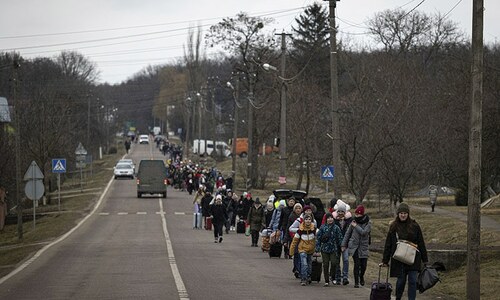
LVIV: “My sunshine, my little one, we are going to win,” sobs a woman, stroking the wooden coffin.
She is standing at the door of a hearse in the centre of Lviv in western Ukraine, where her son’s flower-covered coffin has just been laid by six young soldiers.
He was a military engineer, killed by a Russian artillery strike near Mariupol in the south of the country.
“His name is Vasyl Vyshyvany, he was 28-years-old,” the father says.
He had been mining the area around a bridge to stop the Russian advance when Grad missiles struck the location, killing him instantly, he says.
“There is nobody inside, just fragments.”
His eldest son is also a soldier in the Ukrainian army, posted near the Belarussian border in northern Ukraine.
They have just emerged from Lviv’s iconic Saints Peter and Paul Garrison Church, where a service for three soldiers killed in combat has just been held.
Inside the majestic 17th century baroque church, where the walls are lined with marble statues, dozens of soldiers and civilians have gathered for the ceremony.
Several young women in military fatigues and red berets are holding bouquets of flowers.
At the head of the coffins, which are closed against tradition, six young soldiers serve as the guard of honour with large wooden crosses and the country’s flag.
Next to Vyshyvany is the coffin of Lt Dmytro Kotenko, 20, and Kyrylo Moroz, 25.
In red and gold garb, the Greek Orthodox priest shakes his incense burner while another priest anoints the coffins with holy water.
“We are accompanying them on their final journey, a journey to the sky where they will continue to defend us,” reads one of the faithful.
Clutching a white handkerchief in her trembling hand, Vasyl’s mother staggers and must be held up by a friend.
“Glory to God. Glory to Ukraine,” concludes the priest.
“Why are they taking such good people, why are they taking our children?” she cries.
Her face puffy from tears, a young woman with a black bandana around her head, holds the photo of a young soldier close to her chest.
The funeral processions head out to the military section of the historical cemetery of Lychakiv.
Shots ring out in honour of the fallen and their fellow recruits sing the national anthem. A young soldier wipes tears from his eyes.
Slowly, the coffins are lowered, joining many other fresh graves.
Published in Dawn, March 10th, 2022












































